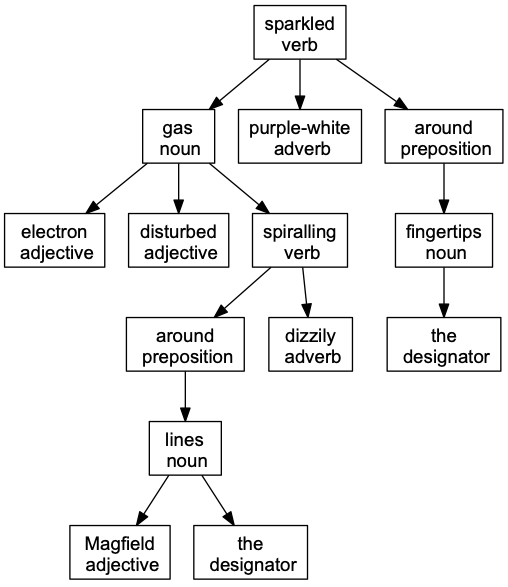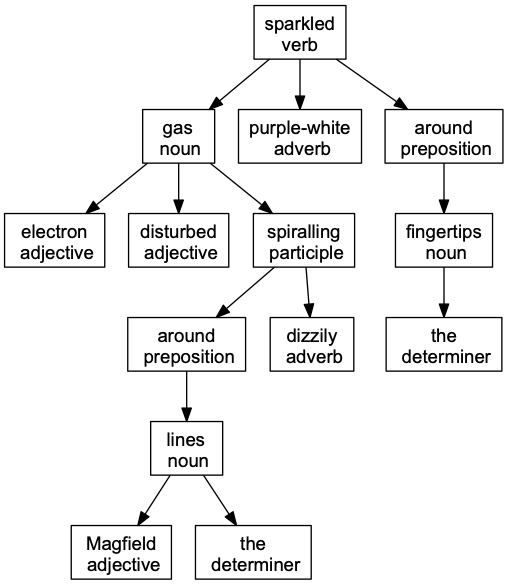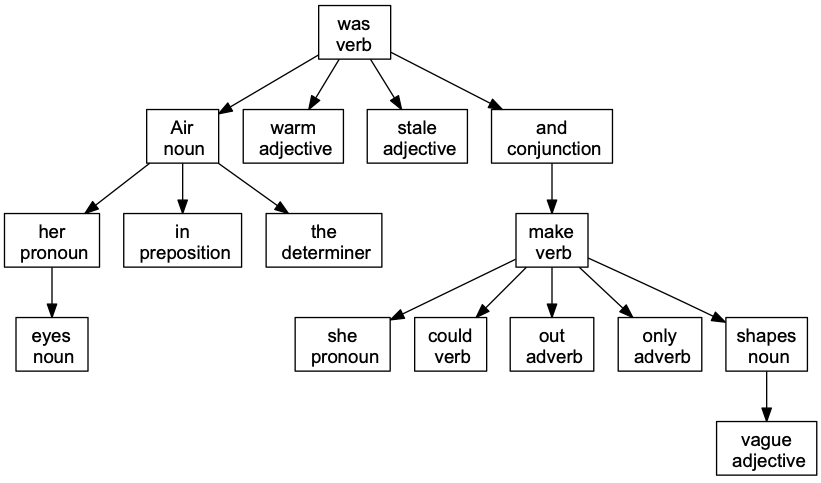This post is a grammar analysis of some material from the first chapter of “Flux” by Stephen Baxter.
Dura woke with a start.
There was something wrong. The photons didn’t smell right.
Her hand floated before her face, dimly visible, and she flexed her fingers. Disturbed electron gas, spiralling dizzily around the Magfield lines, sparkled purple-white around the fingertips. The Air in her eyes was warm, stale, and she could make out only vague shapes.
The first sentence reads:
Dura woke with a start.
This sentence is in a paragraph on its own. The subject of the sentence is “Dura”. The word “woke” is an action verb. The word “start” is a noun and it is the object of the sentence. The word “with” is a preposition.
The second sentence reads:
There was something wrong.
The word “something” is a noun and is the subject of the sentence. The word “wrong” is an adjective that describes “something” and is the object of the sentence. The word “there” is an adverb that specifies that at the time and place where Dura awoke something was wrong. The word “was” is a linking verb, linking the “there” to the “something wrong”. This sentence is also the topic sentence of the paragraph, which is about what is wrong.
The photons didn’t smell right.
The word “photons” is the subject of the sentence. The word “didn’t” is a contraction of “did” and “not”: “did” is a verb and “not” is an adverb that modifies the “did”. The word “smell” is an action verb indicating that the photons gave rise to a particular smell. The word “right” is an adverb modifying “smell”. This sentence states specifically what was wrong.
The paragraph as a whole states Dura’s judgement that something was wrong, and then explains specifically what was wrong.
The first sentence of the next paragraph reads:
Her hand floated before her face, dimly visible, and she flexed her fingers.
This is a complex sentence with two clauses joined by the conjunction “and”.
The first clause has the subject “hand”, modified by the adjective “her” which indicates the owner of the hand. The word “floated” is an action verb. The object of the sentence is “face”, which is modified by “her”. The word “before” is a preposition indicating where the hand is floating. The words “dimly” and “visible” are both adjectives describing her hand.
The second clause has the subject “she”. It has an action verb “flexed”. The object is “fingers”, which is modified by “her”.
The second sentence of that paragraph reads:
Disturbed electron gas, spiralling dizzily around the Magfield lines, sparkled purple-white around the fingertips.
The subject of the sentence is “electron gas”. The word “electron” is a noun and “electron gas” is a noun phrase meaning “a gas of electrons”. The object of the sentence is “fingertips”. The word “sparkled” is a verb, which is modified by the adverb “purple-white”. The word “around” is a preposition indicating how the sparkling is related to her fingertips. The material between the commas is a phrase not a clause because it doesn’t have a reference to the electron gas, which would be the subject of such a clause. The word “spiralling” is a verb, which is modified by the adverb “dizzily”. “Magfield lines” is a noun phrase meaning “lines of the Magfield”.
The third sentence of that paragraph reads:
The Air in her eyes was warm, stale, and she could make out only vague shapes.
It is a complex sentence with two clauses joined by the conjunction “and”. The first clause has the subject “Air”. The word “was” is a linking verb that links the “Air” to the adjectives “warm” and “stale”. The word “in” is a preposition indicating the Air’s relationship to her eyes. The word “eyes” is a noun.
This paragraph is about Dura’s environment and how she was observing it.


